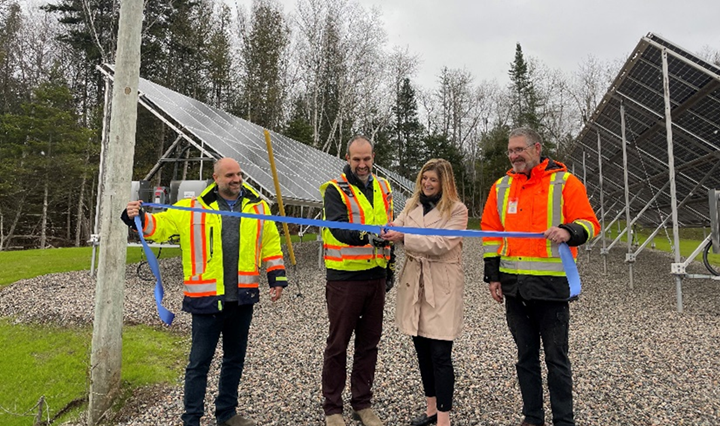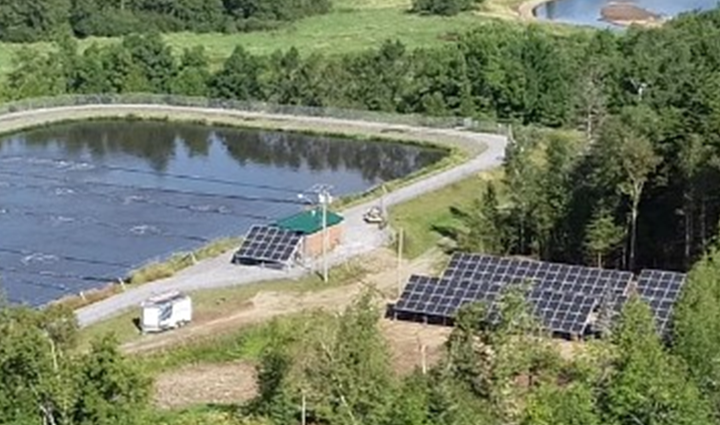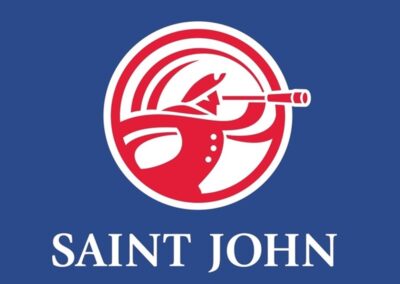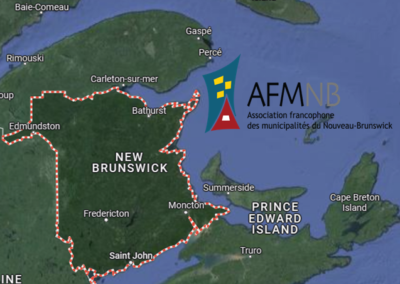Grand Bay-Westfield: Plenty of progress to celebrate, plenty of next steps to plan
If sustainability is a journey, you could say that the Town of Grand Bay-Westfield, New Brunswick is well underway: many actions have been taken, and much has been accomplished.
But there’s still some distance to cover before that elusive goal of net-zero can be reached, and David Taylor is at the centre of that journey. As the Town’s Development Officer for over two decades, he’s helped implement a lot of upgrades and actions, particularly in the areas of energy efficiency, water conservation and renewable energy.
“We took our first big steps in 2003, when some major upgrades were made to our municipal buildings,” he recalls. “Then we followed that up with a second round of efficiency upgrades in 2007, when additional programs became available.” In total, eight municipal buildings have been retrofitted, resulting in annual energy savings of over $13,000.
Key among those upgrades: replacing several existing oil furnaces with electrical heating options such as heat pumps, including an innovative new type with thermal storage. “Oil heating is a special concern for our community because we rely on private wells; we don’t have a municipal water system,” Taylor explains. That means even a small oil leak could cause a big and expensive problem for a neighbourhood, and it’s why transitioning away from oil remains a priority for the Town, for more than just emission reduction reasons.
That reliance on private wells is also why water conservation is a priority. “By-laws have been passed to promote denser development, which improves the feasibility of services like transit and municipal sewage,” says Taylor. “But it also puts a bigger load on the watershed beneath such areas – which is a concern, because there’s no cheap alternative to those wells.” That’s why Grand Bay-Westfield launched a program of water conservation awareness in 2011, and continues to provide a water conservation information package for every new home built in the community.
In partnership with NB Power, the Town also participated in an LED streetlight pilot project in 2007, which led to the Grand Bay-Westfield becoming one of the first NB communities with 100% LED streetlights in 2013.
But perhaps the proudest accomplishment to date has been the installation of a 70-kilowatt solar array adjacent to the Town’s sewage treatment facilities, completed in the fall of 2022.
“The treatment facility is one of our municipality’s biggest power loads because it has pumps that have to run 24/7,” says Taylor, “And we had some land available right beside it, so it was a good match.”
Since coming online last year, the array has reduced the treatment facility’s power bill by about 40%. “And because its peak power production matches the facility’s peak power usage, it’s helped lower power demand charges too.”

But in spite of past accomplishments – including a prestigious 2014 Premier’s Award for Energy Efficiency – there’s no shortage of future priorities on Taylor’s list.
“Grand Bay-Westfield joined the Federation of Canadian Municipalities’ Partners for Climate Protection program in 2016, and we’ve reached Milestone 4, Implementation, on our corporate side,” Taylor explains. “Our base year was 2015, and our original targets were set for 2025 and 2035 – so we’ll be needing to update them soon.”
On the near horizon: taking a stab at addressing transportation emissions.
“For several years we had a COMEX here – an express bus with direct service to Uptown Saint John,” Taylor recalls. “In fact, we installed our first electric vehicle (EV) charger at the Brundage Point River Centre, one of the COMEX stops, for the very reason that it was a place people might park their EV for the day.”
Unfortunately, the COMEX service was discontinued, and in its place a Saint John Transit route that ran to the edge of Grand Bay-Westfield was extended into the center of town.
“But that presents opportunities too,” Taylor points out. “Right now we’re looking at installing several more EV chargers in town, and the new end of the bus route is a logical place to put some.”
As well, the Town is keeping a close eye on Saint John Transit’s new FLEX transit-on-demand service, operated by nimble electric minibuses in some city neighbourhoods. “FLEX is designed to collect passengers across less densely populated areas and feed them into the main transit system, so it might work very well here too.”

There’s also a plan to electrify the Town’s vehicle fleet. “It’s been on our radar for a while, but vehicle cost and availability have held us back. Both of those barriers seem to be diminishing now, so we have a five-year plan in place to transition to EVs.”
Two other exciting projects on the radar: expanding the Town’s solar array to 90 kilowatts; and working with a commercial partner to develop a six-hectare brownfield owned by the Town into a grid-scale solar farm with battery backup.
Perhaps less exciting but equally important will be continuing to integrate sustainability into the Town’s Asset Management Plans. “We’re looking at constructing a new Public Works garage in 2026, and we’ll be aiming for it to be net-zero.”
Finally, Grand Bay-Westfield plans to launch a slate of initiatives in the coming months to help build awareness and motivate action. “The heart of our efforts this year will be building community engagement,” Taylor summarizes. “I think we’ve done well so far, but like most smaller communities we could use more shoulders to help carry the sustainability message. We need to get more people committed, more people involved.”
Taylor is well aware of the climate risks underlining the need for local action. “Flooding punches the hardest,” he reflects. “Every spring, we keep an eye on the St. John River and hold our collective breaths.” Heavy rain and wind events have also impacted the town in recent years, causing washouts and other damage. In 2021, an extensive analysis of the vulnerability of community services and infrastructure was carried out; the resulting Community Climate Adaptation Plan includes an extensive list of actions and recommendations to protect assets.
Thankfully, the Town’s Mayor and Council have been supportive of embedding strong climate action into By-laws, policies, job descriptions and the Municipal Plan; and the journey has been made easier by the Town’s involvement with QUEST since 2015.
The biggest challenge going forward? “Maybe it’s identifying that true, realistic path to Net-zero, plus the funding to get us there,” Taylor muses. “There’s a lot to sort through, and we’re all relying on a lot of pieces coming together – from individuals, municipalities, the Province and the Federal Government.”
And so, a sustainability journey – already well underway – continues.
Image credits: Town of Grand Bay-Westfield
ABOUT THE AUTHOR

Carl Duivenvoorden

About Powered by Communities
Established in 2017, Powered by Communities is an awareness-raising, communications and media platform that highlights and celebrates local community energy initiatives taking place across the country, from coast to coast to coast. The platform inspires, informs and engages its readership with stories and articles detailing community energy initiatives being led by local governments, municipalities, Indigenous communities, community groups, non-profits, charities, and enterprising individuals.

About QUEST Canada
QUEST Canada is a registered Canadian charity that supports communities in Canada on their pathway to net-zero. Since 2007, we’ve been facilitating connections, empowering community champions and advising decision-makers to implement energy use and emissions reduction solutions that best meet community needs and maximize local opportunities. We develop tools and resources, convene stakeholders and rights holders, and advise decision-makers — all with the goal of encouraging, assisting and enabling communities to contribute to Canada’s net-zero goals.

Support local communities by sharing this story
MORE FROM POWERED BY COMMUNITIES
Sign Up
Join the Conversation!
Sign up to get the latest news and updates about QUEST Canada events and receive QUEST Canada's monthly newsletter.




